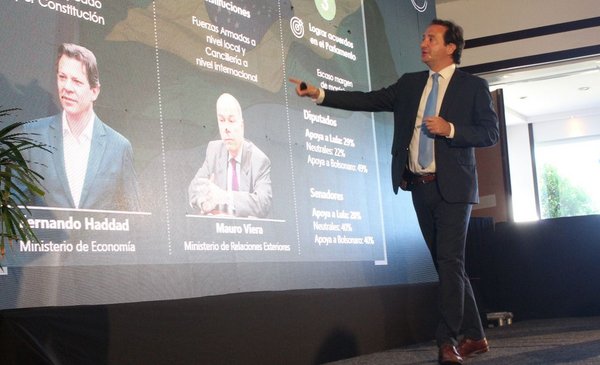In the middle of going back and forth with deputies from the Broad Front about what would be the impact of the government’s social security reform project, the economist Ignacio Munyo stated: “I would be willing to have a law with a single article that establishes increasing the retirement age to 65 years and leaving everything else as it is”.
In his appearance before the House of Representatives commission studying the initiative, the executive director of the Center for the Study of Economic and Social Reality (Ceres) received questions from opposition legislators. The deputy of the MPP, Sebastián Valdomir, asked him if in the medium term the “stability of pension spending” would result in retirement and pensions being less than now if approved.
Munyo replied that this “depends on each case” and that “there is no general answer” since “the casuistry is infinite.” The economist pointed out that factors such as “where is that person” and his “work history” will come into consideration. “It is impossible to say whether it will be better for everyone or not. What’s more: whoever says so will be using assumptions from that trajectory, which are all debatable and changing one will change what his retirement will be,” he summarized. .
Among other questions, Deputy Carballo recalled that the different parastatal funds assured the commission “that they are going to lose” with the unification of the system promoted by the Executive’s project, and he consulted Ceres about what he assessed the impact would be. He also repeated the query regarding whether the liabilities are going to end up charging more or less than today.
As with the previous answer, Munyo replied that “maybe some do and some don’t”. “I cannot guarantee –nor should it be guaranteed– with this law that everyone will work less and earn more. I think it’s impossible and it’s wrong. Some are going to earn more, others less, depending on the career path of each one, the economic situation of the country, training, many things. There is no answer to that question nor does it have to be, “he settled.
Diego Battiste
Ignacio Munyo at a Ceres conference
The executive director of Ceres – a man that the Colorado Party is closely following as a possible candidate – maintained that this reform “cannot ensure life and give the certainty that now in Uruguay we are all going to be happier and we are going to earn more, working less”. “That is not viable nor is it the object – for me – of a law, nor of this reform,” he insisted.
Munyo stressed that the breadth of the “casuistry” depends on “individual effort”: “The one who saves more will have more and the one who saves less will have less, but the State ensures a minimum to all, in some senses high, in others less. The individual savings pillar is the one that answers many of the questions that are here and leaves the door open to uncertainty,” he explained.
The Economist He celebrated “the effort to unify the system”, but that if “the obstacle to having a reform is the parastatal funds, he would separate them” and “concentrate on fixing the BPS, because it is central”.
“I don’t think it’s worth blocking the reform of the BPS for the other savings banks. I think that in Uruguay it is urgent to save the biggest regime, the fattest. All around are very complicated satellites, with millions of vested interests, but if we can’t fix that, let’s try to fix the bigger problem.. Later, in parallel, we will be able to advance with the others”, he declared in Deputies.
Before the consultation of the deputy of the MPP, Gabriel Otero, on the reality of the parastatal savings banks, the economist opined that he has “no interest in any of the savings banks.” “My point was to go to the extreme. What’s more, now I will go more to the extreme. I would be willing to have a law with a single article that establishes increasing the retirement age to 65 and leaving everything else as it is. That would be an advance.” he concluded.
The business for private insurers
The head of the Uruguayan Association of Insurance Companies, Alejandro Veiroj, had raised in commission weeks ago that the reform “will contribute to maintaining a monopoly situation and will deepen the inequality that exists today in the conditions of competition in the insurance market”. The businessman had pointed out that although the current initiative was “an opportunity to reduce one of these asymmetries”, the issue is not addressed and “it is difficult for private operators to enter the market with the current design”.
This was recalled last week by the frontist deputy Valdomir, during the presentation of Ceres. The long-standing issue means that the Banco de Seguros del Estado is the only actor in the insurance market in the pension sector, “concentrating risks of various characteristics, with the possible negative financial consequences that this may cause,” according to the diagnosis of the Commission of Experts. in Social Security two years ago.
Munyo, who conducted a study on the matter with Ceres, recalled that the response that “that market has trouble making itself attractive” “falls out of reach.” “The facts have shown that there is no interest,” declared the economist, who reviewed that the reason expressed by private insurers tends to always be the same: “Because of political risk.”
“It is the risk of changing the rules of the game, given a commitment that is established in the Constitution. So, if a pension readjustment appears, the private agency that is involved in the issue has to assume it and a big problem is generated that, in the facts, has determined that they do not want to participate in that market. We believe that as long as there is no reassurance that there will not be a change in the rules of the game at any time in the future – this could be ten, twenty or five years from now –, they are not going to want to get into that dance, “defined Munyo.


















